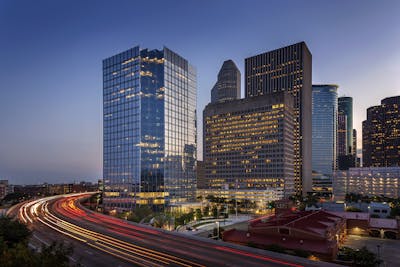
Spring Mountains Visitor Gateway Complex
Sustainable structures highlight epic views
Project Facts
| Location | Mount Charleston, Nevada |
| Owner | U.S. Forest Service |
| Cost | $29 million |
| Status | Completed 2015 |
Overview
The Spring Mountains Visitor Gateway campus includes a new visitor center, an education building, two amphitheaters, covered group picnic sites, nine bridges over small ravines, and more than 40 miles of trails. The project reclaimed a previously developed but deteriorated private site, converting it into a beautiful, environmentally sensitive public venue that elevates travelers’ perceptions of what a U.S. Forest Service facility can offer.
Services
About the Project
Located just 30 minutes from downtown Las Vegas, the 128-acre Spring Mountains Visitor Gateway Complex by the U.S. Forest Service will help people deepen their appreciation of the Spring Mountains National Recreation Area and better experience it in environmentally sustainable ways. The recreation area draws one million visitors per year, and by 2019, 100,000 are expected to begin or end their journey at the Visitor Gateway Complex annually.
The visitor center building provides a convenient and soothing space for patrons to learn about the geography, history, and ecology of the park before they begin their exploration of the rugged mountains. Inside, they can view scientific exhibits and breathtaking views.
During development, Walter P Moore was challenged with creating a structural frame that could handle the area’s high seismicity and heavy snowfalls. However, it also needed to be subtle enough to offer views of the nearby mountains through a towering and expansive curved glass wall on its southern face.
Four different structural systems—which use reinforced concrete, structural steel, glulam beams, laminated wood decking, and masonry perimeter walls clad in native stone—blend into the cohesive, minimalist structure of the visitor center building. The 30-ft tall central chimney, both a functional and beautiful architectural feature of the central stone fireplace, is designed as a concrete box shear wall that resists earthquake forces.
The building also capitalizes on multiple smart building technologies to be highly energy-efficient. Stone boulders, bristle cone pine trunks, and other materials from the immediate environs were sensitively reused throughout the campus.
By using materials with natural beauty and sustainable development practices, the structure complements the mountain vistas and harmonizes the building with its natural environment.






